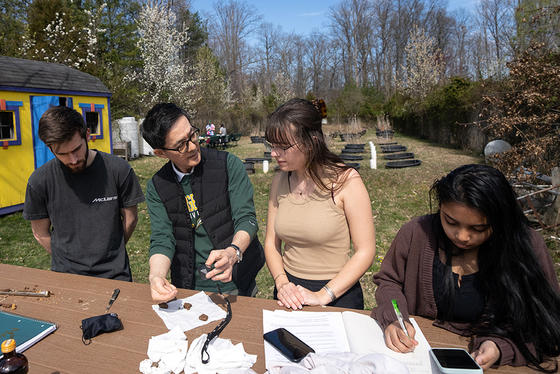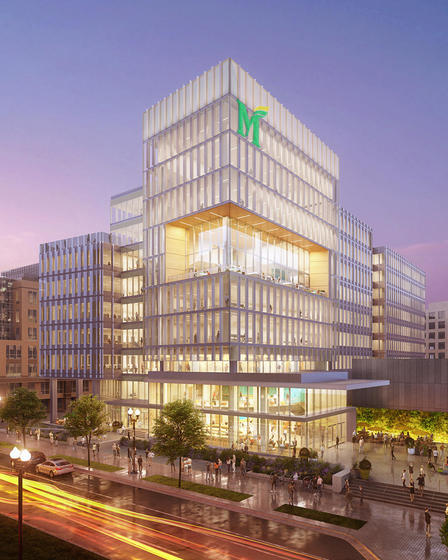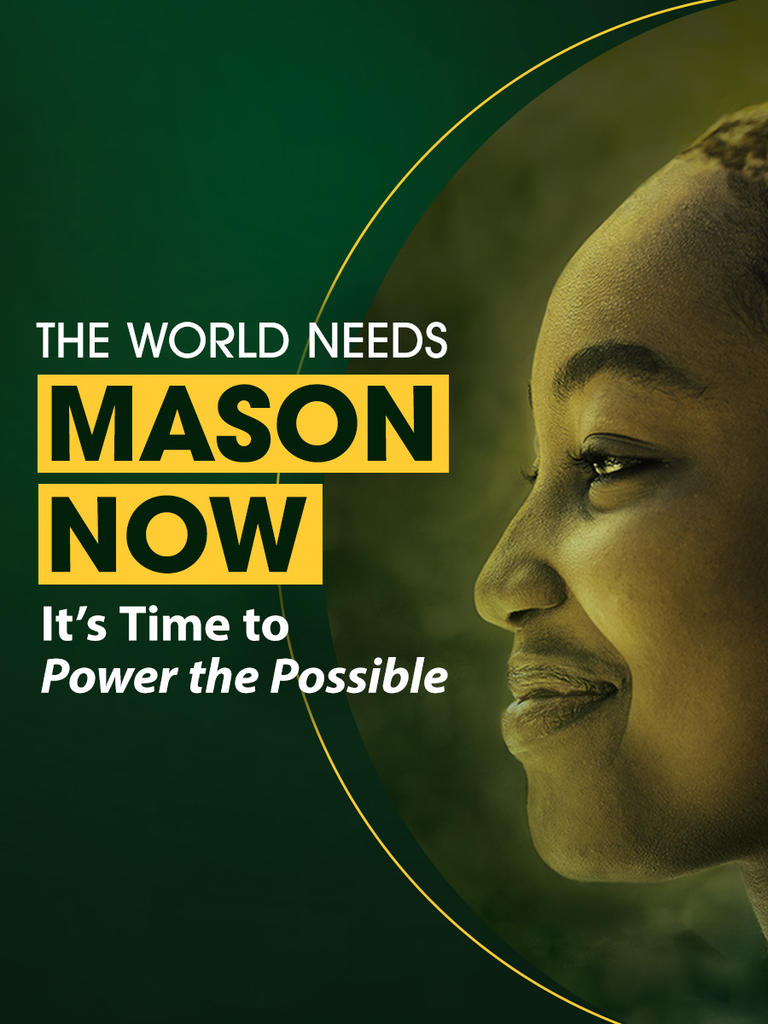On April 20, 2023, President Gregory Washington announced the launch of Mason Now: Power the Possible, a one billion dollar comprehensive campaign for George Mason University.
In his remarks, he laid the foundation for the work ahead. As critical players in the Mason story, we share with you President Washington’s vision for the future—in his own words—explaining why it is Mason’s time to power the possible.
It’s Mason’s Time
There is a long precedent in our state for institutions of higher education rising to address the needs of a country at specific times. It began with William & Mary, whose many firsts mirrored the development of a new nation. The University of Virginia then emerged early in the 1800s with a focus on creating a broader educated populace. The establishment of land-grant universities under Abraham Lincoln—focused on agriculture, science, and engineering to meet the needs of the increasingly industrialized nation— gave birth to Virginia Tech.
A little more than 50 years ago, a group of visionary leaders saw that it was time for a new kind of university, one that could meet the needs of a region that was on the verge of unprecedented growth and boundless possibility. Nicknamed “the 123 Club,” they recognized that what Northern Virginia needed was a first-rate university—one that could educate the workforce that would fuel business growth, enrich the community, increase access to opportunity, and drive innovation.
That is how—often against considerable odds—a branch campus became a commuter school, a commuter school grew into a residential campus, a residential campus added professional schools and an Institute of Science and Technology, and a young university became a Tier 1 research institution.
All of this was possible because our founders had more than vision—they had an enduring commitment to turn that vision into reality. They were lifelong supporters—as donors, board members, advocates, and advisors. And we’ve had great leadership over the last 20 years with Presidents Johnson, Merten, and Cabrera.
Because of them and the generations of Mason alumni who have laid the foundation, we can state with confidence what is increasingly apparent to the region, the commonwealth, and the nation. Now, it is Mason’s time.
To fully realize the future we can create, we need more than our talent, our grit, and our audacity.
Why Mason Now?
Why Mason now? Because Mason is the engine that drives the most populous region in the state. Mason is at the nexus of government and industry, policy and health care, business and technology, culture and innovation.
Why Mason now? Because Mason is an integral partner in why Northern Virginia is home to more than 100 U.S. and global corporate headquarters.
Why Mason now? Because we produce graduates for the 21st century, much as our sister institutions met the needs of previous times. And in true Mason fashion, we defy definitions and exceed expectations. We are a new kind of flagship institution—focused on creating an informed diverse populace for a democracy that is in peril—and a new kind of land-grant institution, one that prepares all of our citizens to be leaders in science, technology, engineering, and mathematics (STEM) fields, business, the arts, health care, politics, and more.
Why Mason now? Because we reflect the diversity of what our country is today and what it will be tomorrow. Beyond race and ethnicity, our inclusivity extends to diversity of thought, experience, and belief systems. Black, white, rich, poor, gay, straight, right, left, American, international, progressive, conservative—and every shade in between. Whoever you are, you can find yourself here, at Mason.

Why Mason now? Because we know that difference makes us stronger. At a time when our society is increasingly divided, all too often seeing things as binary and in opposition, Mason is proof positive that the free exchange of ideas is a defining characteristic of a free society.
And that was there from the beginning. It’s part of our DNA: As one of the original 123 Club members put it, “We had Republicans and Democrats. While we had different political beliefs, we decided not to figure out who is right, but what is right.”
I am proud to be part of an institution that is home to the Antonin Scalia Law School and the Jimmy and Rosalynn Carter School for Peace and Conflict Resolution. I would have loved to have been able to invite them both to campus for a dialogue. And you know what? I think they would have accepted, because they understood that holding an opposing viewpoint doesn’t make someone “evil,” and that open forums re much more productive than echo chambers. And you know it would have been a pretty lively and entertaining evening.
Why Mason now? Because new challenges require new ways of thinking and new folks at the table. Those with the willingness to break the mold and question the status quo. People who believe that a university can accept 90 percent of its undergraduate applicants and also be a Tier 1 research institution. And who refuse to accept that a student’s zip code should determine their educational prospects.
The world doesn’t need to wait for that way of thinking, for those people, or for that university. Because it already exists right here, right now.
The Future We Can Create
To fully realize the future we can create, we need more than our talent, our grit, and our audacity.
To take this next step, we need a level of financial support that we richly deserve but have yet to receive. That is why we are launching Mason Now: Power the Possible, the Campaign for George Mason University, with the goal of raising one billion dollars.
Let me share a few examples of how this campaign will help Mason lead Virginia into the future.
We will dramatically increase scholarships and support services for our students.
We will also name five of our current schools and colleges to add to the Carter, Dewberry, Scalia, Schar, and Volgenau schools. And because we are Mason, we are already off and running: a $50 million planned gift to the George Mason University Foundation has established the Donald G. Costello School of Business.
We will build upon the Mason Virginia Promise— one of the first initiatives I launched as president.
If you are a Virginian, we will provide a pathway for you to earn a four-year degree at Mason. Or, if you want to start your own business, one of our more than 27 Small Business Development Centers around the state will support you. This program exemplifies why this is Mason’s time: it empowers individuals; it rewards entrepreneurship; it powers the economy; and it uplifts communities.
We will strengthen our position as a cultural beacon for Northern Virginia with the reimagination of the Center for the Arts. With increased accessibility, amenities, and technical capabilities, the reimagined center will enhance our ability to educate and entertain for generations to come. The arts invite all to our campuses to share experiences, engage in debate, and enrich perspectives. That is the essence of community-building.

We will strengthen our campuses as true hubs of partnership and innovation, underscoring our symbiotic relationship with the communities in which we are located. A prime example is the transformation of the Arlington Campus into what is now called Mason Square, an urban destination of learning, collaboration, and economic development.
As the largest producer of computing graduates in Virginia, we will forge a new model for what is possible when a university brings scholars, students, and industry together to drive innovation and bring ideas to market. Fuse at Mason Square, a technology-forward building that broke ground last year, is the largest public-private partnership in the state’s history, and it will be Virginia’s first LEED- platinum facility, underscoring our commitment to a sustainable future.
We will continue to expand our commitment to the life sciences, building on last year’s opening of the commonwealth’s first and only College of Public Health. We will meet the critical needs of our region by building a strong talent pipeline based on an inclusive approach to education, research, and practice. I believe this work can lead to Northern Virginia’s first collegiate medical school. Did you notice how I snuck that in? That’s the Mason in me, going right from launching a School of Public Health to envisioning a Mason School of Medicine.
That is just a glimpse of what this campaign will make possible.
Mason’s Next 50 Years
As we look to Mason’s next 50 years, let us remind ourselves that Mason began as a noble experiment, a “what if.” What if a major university could be formed in the second half of the 20th century—far removed from the established power of the state government—to serve the needs of a growing and diverse population? A new kind of land-grant university, one born and willed out of the community. With the core support of a handful of business leaders who saw what this dream could become, the Mason experiment was launched. And because of the audacity of our students, faculty, staff, alumni, and community, it is an experiment that continues to this day.
And knowing the Mason character, I believe it is an experiment that will never end. Because we will never stop questioning, we will never stop exploring, we will never stop discovering.
Our power is proven.
Our possibilities are endless.
Our time is now.

Built by grit, ability, and vision. Help make Mason's next 50 years even more impactful than it's first 50.
Related News
- January 14, 2026
- December 17, 2025
- December 17, 2025
- December 16, 2025
- November 6, 2025
